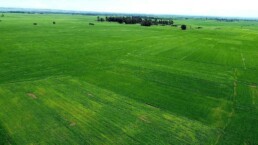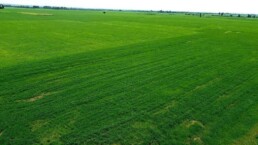The Russian-Ukraine war has exposed the depth of Africa’s food insecurity. But its leaders remain unmoved. The war in Ukraine has illucidated several political and economic vulnerabilities from Europe to China, the US, and Africa. While the type of impact from this war varies significantly across the board, the magnitude of the challenges to communities remains similar. There are daily reports showcasing how the brunt of these consequences is borne by Europe as energy prices reach unbearable levels for industries and households. As Germany alone shells out 200 billion euros to subsidies energy bills and put a break on inflation, the potential of this energy war to bring economic sectors to a halt and fuel social instability has dramatically altered the priority list for European policymakers.
Energy security and energy sovereignty are now the most critical elements of European collective interest which has already led to the EU eyeing gas-rich Algeria in North Africa and other Caucasus energy hubs as substitutes for Russian gas and providing incentives for renewables.

Africa is yet to be harmed by direct reductions in energy supplies. But impending food insecurity has suddenly unraveled, threatening the stability of governments and positive gains from decades of economic growth. Disruptions to wheat supplies are having major repercussions on food security across the continent. A report by the International Centre for migration policy development noted that Sudan saw the price of bread nearly doubling, with some bakeries forced to close following a 60 percent drop in wheat imports since the beginning of the war. The report shows that the fragile stability in Libya could be threatened by food insecurity as it imports 75 percent of its wheat from Ukraine and Russia and supply disruptions have led to increases in bread prices. It singled out Somalia, Sudan, Mauritania, Congo, Kenya, and Eritrea as heavily dependent on wheat imports from Eastern Europe and thus significantly vulnerable to impending food insecurity as fallout from supply disruptions. Ukraine alone accounts for 10% of global wheat production and exports large quantities to North African states, according to calculations by the Kiel Institute for the Kiel-based World Economy.
Prices of bread retain not just nourishment value but also socio-political currency in many African countries. Increments in bread cost had an infamously notable impact in the Arab spring and several North African countries as a result continue to subsidize bread prices to keep disenfranchised populations away from street-level protests. As such, cheap large quantities of Ukrainian and Russian wheat to Africa have provided over 40% of Africa’s demand, according to a New York Times report. A FAO report indicates in 2021, Russia and Ukraine ranked among the top three global exporters of wheat, barley, maize, rapeseed and rapeseed oil, sunflower seed, and sunflower oil. In the African context, its wheat imports have increased by 68 percent to 47 million tonnes from 2007 to 2019, according to the UN.
They show that Africa’s vulnerability due to its significant dependence on non-African sources for food is quite disconcerting. Assessments indicate that African countries imported 54.8 million metric tons of wheat in 2021 while its total production stood at 25.7 million metric tons. It is also reported that 32 percent of total African wheat imports come from Russia and 12 percent from Ukraine; with 25 African countries importing more than a third of their wheat from Ukraine and Russia. Egypt is the largest importer of wheat globally, with 85 percent of its supply provided by Russia and Ukraine, according to research conducted by ICMPD. African Development Bank AfDB warned in April of this year that the continent’s wheat prices have increased by 60%, estimating that the continent will lose up to $11 billion worth of food due to the conflict.
Fertilizer, a critically strategic input without which agricultural production fails, is also imported from Russia, which ranks as the world’s top exporter of nitrogen fertilizers, the second leading supplier of potassic fertilizers, and the third largest exporter of phosphorous fertilizers, according to FAO. Severe shortages of fertilizers for African farmers are expected to cause reductions in harvests in 2023, further straining availability and pushing up prices.
The fact that African countries or the African Union have not placed the continent’s dire dependency on imports for its food supply as their top security and strategic challenge will have multiple ramifications. With Africa spending about USD 35 billion a year on food imports, according to the world bank, the major part of African farmlands is still used to grow coffee, cocoa, and cottonseed oil for export while staple crops of the African diet, wheat, and rice, mainly come from outside of the continent. The growing cost is unsustainable and the risk of instability in the most fragile parts of the continent is too heavy to put the issue on the back burner.

In essence, the wake-up call the energy crisis provided to Europe is what the grain crisis could do to Africa if policymakers seize it as a window of opportunity for policy shifts toward putting more political focus and resources into ensuring food sovereignty. Africa’s food security is tied to a permanent geo-strategic hotspot is a stranglehold that can be avoided by investing in the farms of Africa. With wheat consumption in Africa projected by the UN to reach 76.5 million tonnes by 2025, of which 48.3 million tonnes or 63.4 percent is projected to be imported outside of the Continent, there is a critical need to reevaluate the traditional idea of Africa importing its food while it possesses 60 percent of the global arable land to insulate itself from external shocks where it maintains little or no influence.
While Antonio Guterres’s warning in March of this year that many African countries were at risk because of their dependence on Russia and Ukraine for food may not be taken seriously, lessons from Ethiopia, where a government-led program to massively expand wheat production is expected to turn the country into grain self-sufficiecy as early as 2023, could propel the issue of food sovereignty in Africa to the front of debates. Ethiopia plans to reverse an annual practice that sees it importing 85% of its wheat demand. If its self-sufficiency drive becomes successful as planned, the policy implications in trade, security, and geopolitics will be far-reaching and consequential beyond Africa. Considering how strongly food insecurity is linked to migration and the refugee crisis in Europe, a favorite punching bag for surging right-wing politicians, the west should also support African best practices in agriculture as an act of self-interest.